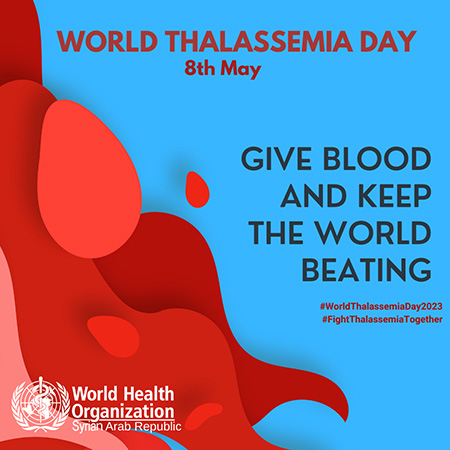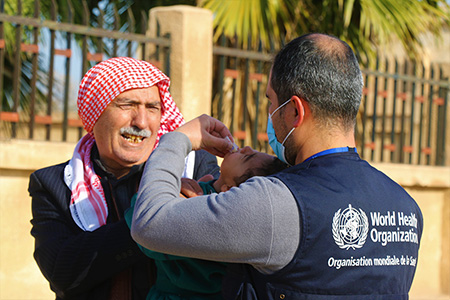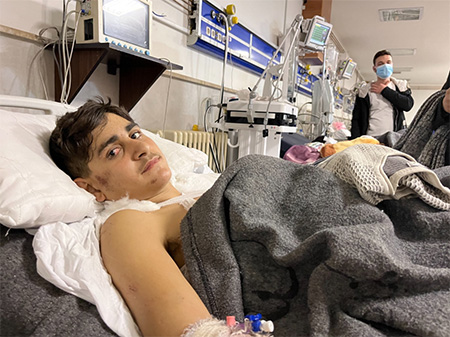On World Thalassemia Day 2023, WHO acknowledges support of donors and health care workers who provide hope to thalassemia patients in Syria
 8 May, 2023 – On World Thalassemia Day 2023, WHO stands in solidarity with the thousands of thalassemia patients in Syria and their families.
8 May, 2023 – On World Thalassemia Day 2023, WHO stands in solidarity with the thousands of thalassemia patients in Syria and their families.
“Despite a weakened healthcare system in Syria as a result of years of conflict, there are still glimmers of hope everyday thanks to the support of donors and the tireless dedication of healthcare workers who make it possible for thalassemia patients in Syria to access to life-saving care,” said Dr Iman Shankiti, WHO Representative a.i. in Syria.
From remote villages to urban centers, healthcare workers and health partners have made a difference in the lives of patients – bringing hope and healing to those who need it most.
But the work is far from over. Thalassemia patients in Syria still face many challenges in accessing the treatment and care they need and the health system is facing shortages of medicine, equipment, and trained healthcare professionals.
“Despite ongoing conflict and the disruption of the healthcare system in Syria, WHO remains committed to supporting these patients and their families. This World Thalassemia Day, we pledge to continue our efforts to improve the health situation in Syria and ensure that every patient, no matter where they are, has access to the care and treatment they need. Together, with healthcare workers and aid organizations, we can make a difference and give a brighter future to those who need it most,” added Dr Shankiti.
WHO Joins Forces with UNICEF, Gavi, and the Syrian Ministry of Health to vaccinate unvaccinated children During World Immunization Week
 Vaccination in Al-Qamishli in North-East Syria7 May, 2023 –Damascus, Syria - the World Health Organization (WHO) together with UNICEF, Gavi, and the Syrian Ministry of Health, is proud to participate in World Immunization Week in Syria, from 7 to 11 May, to promote the life-saving benefits of vaccines and encourage more people to get vaccinated.
Vaccination in Al-Qamishli in North-East Syria7 May, 2023 –Damascus, Syria - the World Health Organization (WHO) together with UNICEF, Gavi, and the Syrian Ministry of Health, is proud to participate in World Immunization Week in Syria, from 7 to 11 May, to promote the life-saving benefits of vaccines and encourage more people to get vaccinated.
This year’s theme for World Immunization Week is “The Big Catch Up”, highlighting the role of vaccines in bringing people closer to their loved ones, communities, and goals. Through our participation in World Immunization Week in Syria, we aim to raise awareness about the importance of vaccines in preventing diseases and protecting individuals and communities.
During World Immunization Week, the joint collaborative efforts of WHO, UNICEF, and the Syrian Ministry of Health will focus on vaccinating as many people as possible against vaccine-preventable diseases through intensified multi-antigin vaccination campaign targeting under 5 children in all governorates. Different routine vaccines such as polio, rubella, and hepatitis-B will be provided during this campaign in addition to the provision of COVID-19 vaccine to targeted adults. In this campaign, vaccination services will be provided through fixed facilities and mobile teams in rural and hard to reach areas. In Additional to the provision of the needed technical assistance and on job training to healthcare workers, and conducting community outreach to promote vaccination.
“Vaccines are critical in preventing diseases and protecting communities,” said Dr Iman Shankiti, the World Health Representative a.i. in Syria. “By working together with all of our partners, including UNICEF, Gavi, and the Syrian Ministry of Health, we can ensure that everyone, no matter where they live, has access to life-saving vaccines. This collaboration is key to eradicating vaccine-preventable diseases and achieving universal health coverage.”
WHO is committed to promoting the health and well-being of people around the world, and vaccines are a critical tool in achieving that goal. Join us in celebrating World Immunization Week in Syria and supporting the power of vaccines to protect individuals and communities from deadly diseases.
WHO delivers critical healthcare support to earthquake-affected areas of Syria
 14-year Ahmad, receiving trauma services at a WHO-supported hospital in Aleppo.30 April 2023 – WHO has been working tirelessly to provide emergency health support to those affected by the recent earthquakes in Syria. As of 16 April, the organization has provided medical care and supplies to 41 000 individuals in affected areas.
14-year Ahmad, receiving trauma services at a WHO-supported hospital in Aleppo.30 April 2023 – WHO has been working tirelessly to provide emergency health support to those affected by the recent earthquakes in Syria. As of 16 April, the organization has provided medical care and supplies to 41 000 individuals in affected areas.
The recent earthquake has caused significant damage to health infrastructure in Syria, exacerbating an already challenging health crisis in the country. WHO has been working to provide critical medical care and supplies to those in need, including vaccinations, treatment for injuries and illnesses, and mental health support.
Since the occurrence of the earthquake, WHO has conducted a small-scale vaccination campaign, reaching over 197 000 children under the age of five. The organization has also provided 660 000 individuals with mental health and psychosocial support and referred over 3300 people to health facilities for reproductive and child health, internal medicine, and malnutrition care.
In addition, between 3 and 16 April, WHO has delivered over 129 metric tonnes of medicines, medical supplies, and equipment, valued at over $ 993 000 to health facilities in affected areas.
"We are deeply committed to delivering vital healthcare services and support to the earthquake-affected areas of Syria. Our teams have been working tirelessly to provide essential medical supplies, vaccinations, nutrition programs, and healthcare operations.” Said Dr Iman Shankiti, WHO Representative a.i. in Syria. “Through coordination, partnerships, and efficient logistics, we strive to make a positive impact on the well-being of the affected population. Together with our partners, we are dedicated to building resilience, ensuring access to quality healthcare, and creating a healthier future for all." Dr Shankiti added.
WHO is committed to continuing its efforts to provide lifesaving health support to those affected by the earthquakes in Syria. The organization is grateful for the support of its partners and donors and encourages others to join in its efforts to provide critical health care to those in need. For the earthquake response in Syria, WHO estimates it will require 60.2 million US$ for both the immediate 90-day response (18M) followed by short- and medium-term response needs (42.2M) for the rest of 2023.
Standing with Syria: how WHO and its partners deliver vital healthcare to communities devastated by earthquakes
 PHC services provided at a WHO-supported medical point in Latakia26 April 2023, Damascus – In the early part of this year, southern Türkiye and northern Syria were struck by a series of devastating earthquakes that caused widespread damage to homes and infrastructure. In Syria alone, the earthquakes affected a staggering 4 million people. Out of this number, around 2 million were severely impacted, and more than 200,000 individuals were forced to leave their homes across Aleppo, Hama, Latakia and Tartous governorates. According to the latest earthquake situation report by the World Health Organization , there is a continued and urgent need for assistance to help the affected communities in Syria.
PHC services provided at a WHO-supported medical point in Latakia26 April 2023, Damascus – In the early part of this year, southern Türkiye and northern Syria were struck by a series of devastating earthquakes that caused widespread damage to homes and infrastructure. In Syria alone, the earthquakes affected a staggering 4 million people. Out of this number, around 2 million were severely impacted, and more than 200,000 individuals were forced to leave their homes across Aleppo, Hama, Latakia and Tartous governorates. According to the latest earthquake situation report by the World Health Organization , there is a continued and urgent need for assistance to help the affected communities in Syria.
Access and availability of medication for chronically ill patients remains a primary concern. Outreach screening for tuberculosis (TB) at shelters has identified 42 new confirmed TB cases, while the increase of leishmaniasis cases is also of concern. Rubble and debris, as well as interrupted sanitation services, promote the breeding of sandflies and increase the risk of infection among people residing in shelters or make-shift arrangements where exposure can occur.
Furthermore, mental health needs continue to increase, with mental health and psychosocial support (MHPSS) remaining the most requested service. Hospitals in earthquake-affected areas are also reporting limited functionality due to a critical need for medical equipment and associated supplies and spare parts to enhance the capacity of operation theaters, intensive care units (ICUs), and diagnostics.
"The emergency health response continues to be led by the Ministry of Health (MoH) and in close coordination with the Directorate of Health (DoH) at governorate level. WHO remains committed to delivering essential health services and supplies to those affected by the earthquakes in Syria. Our emergency response is focused on key pillars such as leadership and coordination, continuity of essential health services, disease surveillance, and mental health support. WHO is working closely with our partners to ensure that the most vulnerable populations receive the care and resources they need," said Dr. Iman Shankiti, WHO Representative a.i to Syria.
Since the early hours following the first earthquake, WHO and its partners have made a significant impact on the ground in affected areas. Eighteen mobile medical teams (MMTs) have been deployed in Aleppo and Hama governorates, providing over 65,839 consultations and 850,528 treatments to people in need. The MMTs have covered 90 shelters and affected communities, ensuring that essential health services are accessible to those affected by the earthquake. WHO has also delivered essential medicines and supplies to 50 health facilities and public hospitals in earthquake-affected areas, with a total value of 3.61 million USD, sufficient to cover the needs of more than 340,000 beneficiaries. Additionally, WHO has continued to provide mental health and psychosocial support (MHPSS) services through its support to health facilities in Aleppo, Hama, Latakia, Tartous, and Rural Idleb, providing over 660,000 mental health services since the start of the response.
Despite the progress made so far, the ongoing needs of the affected populations cannot be overstated and the affected communities remain highly vulnerable to secondary effects, as well as any new emergency. We urge all concerned parties to provide the necessary support to the affected populations to alleviate their suffering and help them rebuild their communities. Together, we can make a difference and help those who need it most.
To support WHO’s response in Syria, please visit:
https://earthquakeresponse-turkiyesyria.who.foundation
For the latest information on the earthquakes, please see:
Earthquake interactive dashboard


